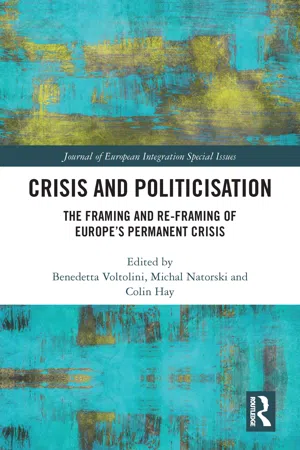
Crisis and Politicisation
The Framing and Re-framing of Europe's Permanent Crisis
- 184 pages
- English
- ePUB (mobile friendly)
- Available on iOS & Android
Crisis and Politicisation
The Framing and Re-framing of Europe's Permanent Crisis
About This Book
This book elucidates the link between the politics of a now seemingly permanent crisis in Europe and the politicisation of European integration. Looking at the epistemic dimension of crises, it suggests that the way in which a crisis is framed and contested determines its potential impact on the level of politicisation of European integration.
Europe is more challenged and contested today than it has even been, facing crisis of an almost existential kind. Yet, political crises are manufactured and narrated, so Europe has the possibility to intervene and 'bring about her recovery', instead of letting these crises prove terminal. This book explores the political process in and through which certain events come to be framed as constitutive of a moment that requires a decisive intervention. It shows that crises require a double framing: a situation needs to be identified as one of crisis in the first place and, subsequently, the nature and character of the crisis need to be specified. By examining a wide range of policy areas, the book demonstrates that framing of crises, i.e., identifying one situation both as a crisis and a crisis of a particular kind, contributes to the politicisation (or depoliticisation) of the process of European integration.
The chapters in this book were originally published as special issue of Journal of European Integration.
Frequently asked questions
Information

Politicizing support and opposition to migration in France: the EU asylum policy crisis and direct social activism


Introduction
The migration crisis, mobilization and the politicization of Europe
Direct activism and the framing of crises
Table of contents
- Cover
- Half Title
- Series Page
- Title Page
- Copyright Page
- Table of Contents
- Citation Information
- Notes on Contributors
- Introduction: the politicisation of permanent crisis in Europe
- 1 Politicizing support and opposition to migration in France: the EU asylum policy crisis and direct social activism
- 2 ‘Push or pull’? Framing immigration in times of crisis in the European Union and the United States
- 3 Construction of the Eurozone crisis: re- and depoliticising European economic integration
- 4 The Troika in its own words: responding to the politicisation of the southern European crises
- 5 Half-full or half-empty? Framing of UK–EU relations during the Brexit referendum campaign
- 6 A “Europe des Nations”: far right imaginative geographies and the politicization of cultural crisis on Twitter in Western Europe
- 7 United we stand in metaphors: EU authority and incomplete politicisation of the crisis in Ukraine
- 8 Ontological crises, framing and the (de)politicisation of EU foreign policy: the case of EU-Israel relations
- 9 European foreign policy in times of crisis: a political development lens
- Index